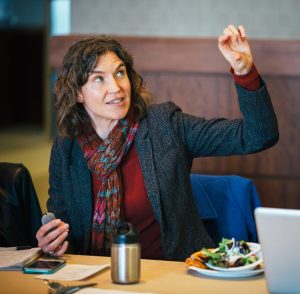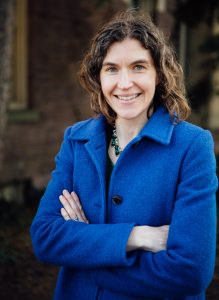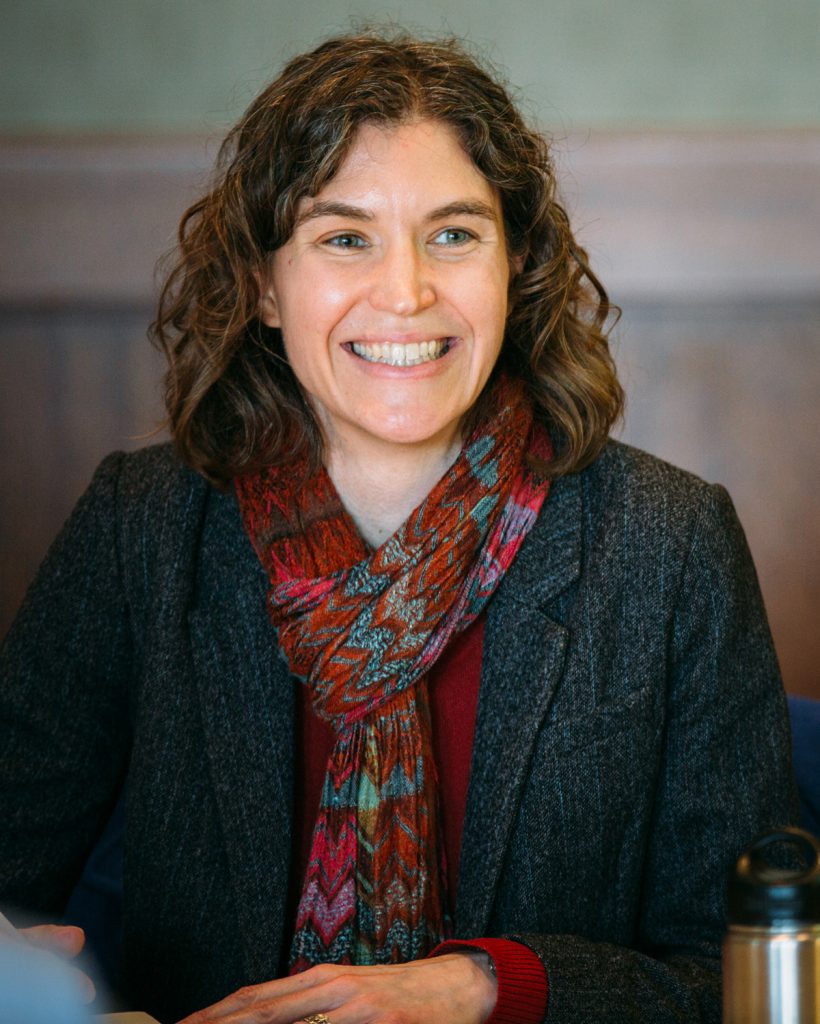By Kevin Gray
Marie Fechik-Kirk was introduced as Lafayette’s first director of sustainability last November. Fechik-Kirk came to Lafayette from the Sports & Exhibition Authority in Pittsburgh, where she was sustainability coordinator. She is a Penn State graduate and earned master’s degrees from Middlebury College and Duquesne University. She answered questions in an interview:
What is your background in sustainability and higher education?
I went to Duquesne University for an MBA with a focus on sustainability. There, sustainability was integrated into all my classes. I also did a lot of project work, so it was a great opportunity to get some hands-on work. For example, we did a communications analysis for Bayer MaterialScience. Our project worked really well, so I was hired on as a contractor to implement some of the solutions that we created as an MBA project team. While I was working there, I got to supervise another MBA project team working on integrating sustainability into one of our tech development tools. I also spent nearly two years as the director of sustainability at The Hill School, a boarding school in Pottstown, Pennsylvania. In some ways, it was a very similar environment to a college: a campus with students there 24/7, eco captains in the dorms. People eat all their meals there, so you consider food waste and you consider transportation because, just like in a collegiate environment, you have students who are from out of state. There are a lot of similarities.
 What are some examples of concrete actions that you took to increase sustainability?
What are some examples of concrete actions that you took to increase sustainability?
Just like Green Move Out at Lafayette, we had a similar program at The Hill School. I enhanced it to increase the number of volunteers and opportunities for donations and, in doing so, we nearly doubled donations to more than two tons. We worked with a number of community partners. We were taking glasses to the Lions Club, shampoo to a local horse farm, and much more. The custodial team was very happy that the program made their job easier. We went from a handful of volunteers the first year to about 50 the second year. And the program went from a handful of dorms the first year to almost all the dorms on campus. We also did a lighting retrofit in the dining hall that allowed us to reduce energy use there by 80%. I also worked with the facilities team, development office, and students to find a use for a gift from the Class of 2010. We came up with the idea of adding a solar panel in the turret of the chapel. The chapel is now powered by the sun and the project has a six-year payback. More recently, I was with the Sports & Exhibition Authority in Pittsburgh and was working on a LEED recertification project that required us to cut down on our landfill waste. We partnered with Trex, and one of the solutions we found was to take plastic film—for example, from dry cleaning and bread bags, and shrink wrap—bale it and send it to Trex. I also wrote a $75,000 grant for solar panels on a parking garage.
 What is your philosophy regarding sustainability?
What is your philosophy regarding sustainability?
I think sustainability is interdisciplinary, so you definitely have to collaborate with other people to try to find solutions. You need to enhance communication and make it a win-win for everyone, which is really key. For example, when I was at Bayer MaterialScience on our MBA project team, not all of the business units were aware of our sustainability initiatives. When we interviewed suppliers and customers, they also didn’t know about any of the things we were doing. By enhancing sustainability communications, we created a win-win because we were helping the sales and marketing teams, and it was helping give individual employees a better sense of what was happening. It also helped the company in attracting Millennials who are interested in that focus.
 What are some things you would like to improve on campus?
What are some things you would like to improve on campus?
We’re wrapping our arms around where we are and developing a five-year plan to elevate sustainability at Lafayette. We have done some pretty intense energy audits to look at our operations and have implemented real cost initiatives. It helps to save energy and, hopefully, in many cases, helps to increase efficiency. So those things are already in place and I know the facilities team has been working a lot behind the scenes. They have increased efficiency within the steam plant. My goal would be to make some of those initiatives more visible, and also to enhance efficiency and reduce our waste. We are finding some interesting ways we can do these things that are collaborative and also have a positive impact on the community. For example, through the Green Move Out program, students donate school supplies, books, food, toiletries, and more to community partners. This ultimately saves the college money because there’s less waste around that the grounds team needs to pick up and it saves a little in [landfill] fees. Plus, it fosters a lot of goodwill for the community and gives the students an opportunity to show good leadership…We have to collaborate to find solutions in other areas where we are not as strong, and making sure the outcome benefits all involved is an important aspect of our success. My vision for Lafayette will account for this.
What does Lafayette do really well in terms of sustainability?
One of things is student and faculty engagement. Students and faculty were strong proponents in creating my position, and there are a vast number of classes that have a sustainability component to them. I’ve attended several classes and have seen projects that are related to sustainability. It’s great to see students involved in research and use their time on campus to develop real skills for the workplace.
 What are some examples of concrete actions that you took to increase sustainability?
What are some examples of concrete actions that you took to increase sustainability? What is your philosophy regarding sustainability?
What is your philosophy regarding sustainability? What are some things you would like to improve on campus?
What are some things you would like to improve on campus?